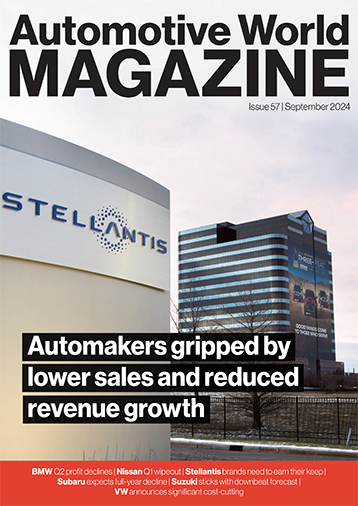Sales by the major carmakers fell by an average of just 2.7% in Q2 2024 from a year earlier and the total number of units sold fell by 3.7% to 15.09 million. There were 12 automakers reporting lower sales and four reporting higher, with changes ranging from minus 12.8% for Stellantis to plus 7.1% for Suzuki. It was the fourth successive quarter of weaker sales growth year-on-year.

Despite the sales decrease, average revenue grew by 4.3%, the fourth successive quarter of weaker revenue growth as the favourable price environment enjoyed by the automakers during the time of supply shortages has ended. The weakening of the Japanese yen gave a significant boost to the revenues of the Japanese producers, who occupied the top four positions on the chart, ranging from 21% at Suzuki to 10.5% at Mazda.
Change in revenue (%) Q2-24 -v- Q2-23
Change in Ebit margin (points) Q2-24 -v- Q2-23
Change in unit sales (%) Q2-24 -v- Q2-23
Among the 14 automakers that reported quarterly earnings, the average Ebit margin fell by 0.5 points to 7.5%, as eight companies reported margin declines and six reported increases. Suzuki posted the biggest increase at 2.7 points, followed by General Motors at 1.8 points.
Nissan, reported the steepest margin decline with a drop of 4.4 points as its profit fell to zero, brought down by a substantial increase in selling expense, particularly in the US, and weaker sales. Nissan’s margin decline slightly outpaced the 3.3 points fall to 6.3% at Tesla, which reported its sixth successive margin drop.
Average y-o-y change in quarterly revenue, 16 automakers (%)
Average y-o-y change in quarterly Ebit margin, 14 automakers (points)
Average y-o-y change in quarterly sales, 16 automakers (%)
The Japanese manufacturers are expecting to lose the tailwind from the weaker yen in the current fiscal year, but there was little sign of this in the first quarter, when favourable currency effects contributed some ¥588bn (US$4bn) to their combined operating profit.
In July, the IMF kept its forecast for global GDP growth in 2024 at 3.2%, unchanged from its April status. HSBC kept its 2024 forecast at 2.6%, unchanged from its June status, as small upgrades to the European forecasts were offset by downgrades to Mexico, Thailand, Japan, Australia and New Zealand.
The Conference Board’s forecast was also unchanged in July, projecting 3.1% growth for 2024.
The relatively stable macro-economic outlook is broadly mirrored in the automakers’ forecasts for 2024 or 2024/25, most of which were unchanged when the Q2 (or fiscal Q1) results were announced, though a few manufacturers lowered expectations for their sales in China.









